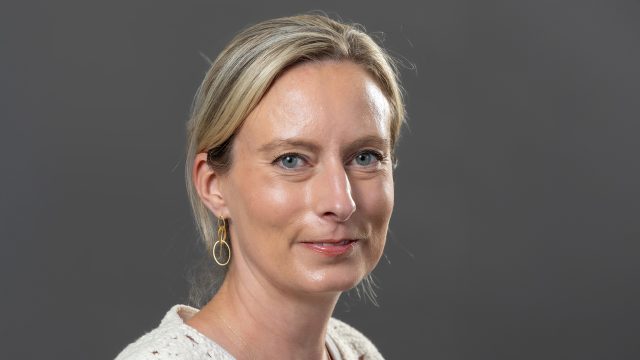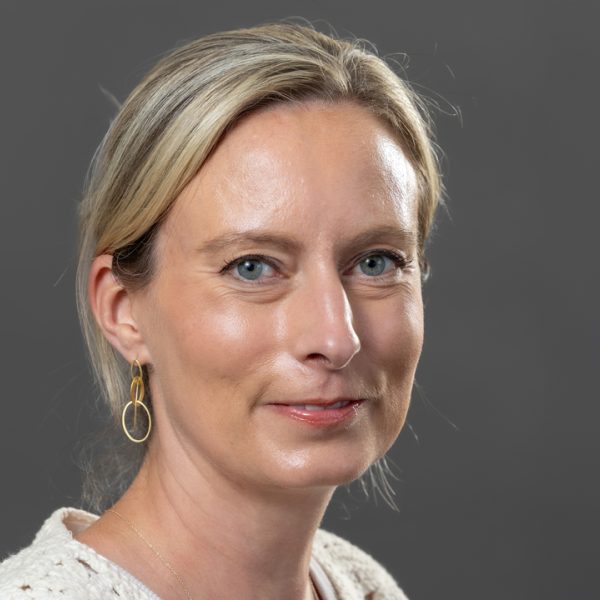Hematopoietic stem cells; leukemia; bone marrow failure; myelodysplastic syndrome; myeloproliferative neoplasms; genetic fate tracing; CRISPR-Cas9; scRNA sequencing

Our Focus
Bone marrow fibrosis, a complication in chronic blood cancer, drastically reduces patients' chances of survival. Our goal is to better understand the molecular and cellular drivers of this condition and use this knowledge to develop targeted treatments. This is especially important for the growing number of patients affected by fibrosis and organ failure caused by chronic blood cancer or other types of cancer. Building on progress made during the first phase of the Oncode project, we remain dedicated to research that translates directly into therapies to improve patients’ lives.
In our current work, we combine advanced genetic tools, such as fate mapping, with single-cell RNA sequencing to explore the disease in greater detail over time and across different regions of the bone marrow. We aim to identify the true origin of fibrosis-driving cells. By studying the interactions between malignant cells and fibrosis-causing cells, we are working toward strategies to restore healthy blood production and reduce fibrosis. Recent discoveries from our lab have revealed a surprising role for vitamins in driving bone marrow fibrosis and provided an explanation for why clinical trials using Smoothened inhibitors to treat myeloproliferative neoplasms (MPN) and myelofibrosis (MF) have been unsuccessful.
About Rebekka Schneider

Rebekka Schneider
My Research
I am a pathologist by training with a strong background in clinical hematopathology and basic research. In my MD thesis (RWTH Aachen, Germany), I focused on cellular plasticity and tissue engineering of skin and continued independent research projects in parallel to my residency/fellowship in Pathology with focus on the role of the microenvironment in myeloid malignancies but also chronic kidney disease (2008-2012). I performed my post-doc (after MD qualification) in Ben Ebert‘s lab at Harvard Medical School from 2012-2015. After my postdoctoral fellowship, I returned to Aachen to finish my fellowship in Pathology, and started my own independent research laboratory at Erasmus MC. In parallel to running my laboratory at Erasmus MC, I finalized my PhD (conducted at Harvard Medical School, Boston, USA and Erasmus MC, Rotterdam).
My primary focus is disease-oriented laboratory investigation of clonal myeloid neoplasms, employing a range of genomic technologies as well as classical cellular and molecular biology experimental approaches. My central goal is to translate my research directly into development of novel targeted therapeutics for the vast and growing patient population suffering from fibrosis and organ failure due to chronic blood cancer or even cancer more broadly. I made significant discoveries for improved diagnosis and treatments for blood cancers. In summary, the major achievements of my lab have been the identification of fibrosis-driving cells in primary myelofibrosis (PMF) and the identification of their activating mechanisms. This work has led to the initiation of a clinical trial for which we just received funding for and which will be started in 2023. I have filed a priority patent (application # 20187323.9; date of filing: 23/07/2020) to protect the new use of Tasquinimod for MPN after preclinical proof-of-concept was demonstrated. I have received an ERC proof-of-concept grant beginning of 2021 to translate our preclinical findings into a clinical trial. Active Biotech (NASDAQ STOCKHOLM: ACTI) has entered into an exclusive license agreement with us (Oncode Institute) for the global rights to patents relating to the use of tasquinimod and other inhibitors of S100 for use in treatment of myelofibrosis (MF).
As a post-doctoral research fellow, I was the first to discover recurrent mutations in a blood cancer called del(5q) MDS. Importantly, we identified a mechanism in the mutated, disease-causing cells that is an “Achilles Heel” and can be used to specifically eliminate the disease-causing cells without affecting normal blood formation – one of the main challenges in cancer research. In my laboratory at Erasmus MC, we now thrive to identify novel therapeutic strategies to eradicate disease-initiating in myeloid blood cancers. Additionally, I identified that inflammation and activation of the innate immune system are central mechanisms in the development of not of myeloid malignancies. Using CRISPR/Cas9-gene editing, I showed that targeting activated mechanisms can restore the normal function of diseased hematopoietic cells. In my lab, we now focus on understanding the underlying mechanisms for the inflammation in the bone marrow (protein synthesis, aging etc) and are searching for novel therapeutic targets to block inflammation and inhibit disease progression.
In the next 5-10 years I want to focus on identifying novel druggable targets in myeloid malignancies by using the multitude of cellular and molecular assays established in my group. I furthermore intend to bring together scientists, societies and companies working in the abovementioned areas of research, in order to intensify their interaction, and to thereby foster the translation of several innovative treatment concepts into the clinic.
Awards
2022: Gerhard Domagk Award for Excellence in Cancer Research (Gerhard Domagk Foundation, Münster, Germany)
2022 Vidi
2021 ERC Proof-of-Concept Grant
2019: Swammerdam Award Nederlandse Vereniging voor Hematologie (Dutch Hematology Association)
2017: ERC Starting Grant; deFIBER; Dissecting the cellular and molecular dynamics of bone marrow fibrosis for improved diagnostics and treatment
2017: EMC fellowship; Functional and molecular dissection of the clonal selection in myeloproliferative neoplasms
2017: International MPN foundation; Dissecting the cellular and molecular dynamics of bone marrow fibrosis for improved diagnostics and treatment
2018: KWF Bas Mulder Award; Dissecting the mechanisms of malignant transformation in del(5q) myelodysplastic syndrome to selectively target the disease-initiating hematopoietic stem cells
2017: European Hematology Association (EHA), John Goldman Clinical Research grant; Functional dissection of abnormal protein translation in the erythroid differentiation defect in del(5q) MDS
2017: Johann Georg Zimmermann Award for Excellence in Cancer Research
2016 Innovation Award German Academic Medicine (Innovationspreis Deutsche Hochschulmedizin)
2016: Artur Pappenheim Award, Deutsche Gesellschaft für Hämatologie und Onkologie (DGHO; German Society for Hematology and Oncology)
Key Publications
Leimkühler NB, Gleitz HFE, Ronghui L, Snoeren IAM , Fuchs SNR, Nagai JS, Banjanin B, Lam KH, Vogl T, Kuppe C, Stalmann USA, Buesche G, Kreipe H, Gütgemann I, Krebs P, Banz Y, Boor P, Wing-Ying E, Brümmendorf TH, Koschmieder S, Crysandt M, Bindels E, Kramann R, Costa IG and Schneider RK. Heterogeneous bone marrow stromal progenitors drive myelofibrosis via a druggable alarmin axis; Cell Stem Cell 2021 Apr 1;28(4):637-652.e8. doi: 10.1016/j.stem.2020.11.004
Jansen J, Reimer KC, Nagai JS, Varghese FS, Overheul GJ, de Beer M, Roverts R, Daviran D, Fermin LAS, Willemsen B, Beukenboom M, Djudjaj S, von Stillfried und Rattonitz S, van Eijk LE, Mastik M, Bulthuis M, den Dunnen W, van Goor H , Hillebrands JL, Triana SH, Alexandrov T, Timm MC, Tideman van den Berge T, van den Broek M, Nlandu Q, Heijnert J, Mooren F, Kuppe C, Miesen P, Grünberg K, Ijzermans J, Steenbergen T, Czogalla J…and Costa IG#, Schneider RK#, Smeets B# and Kramann R#. SARS-CoV-2 infects kidney cells and causes kidney fibrosis. Cell Stem Cell 2022 Feb 3;29(2):217-231. #equal contribution.
Stalmann USA, Banjanin B, Snoeren IAM, Nagai JS, Leimkühler NB, Li R, Benabid A, Pritchard JE, Malyaran H, Neuss S, Bindels EM, Costa IG, Schneider RK. Single-cell analysis of cultured bone marrow stromal cells reveals high similarity to fibroblasts in situ. Exp Hematol 2022 Mar; epub ahead of print
Stalmann USA, Ticconi F, Snoeren IAM, Li R, Gleitz HFE, Cowley GS, McConkey ME, Wong AB, Schmitz S, Fuchs SNR, Sood S, Leimkühler NB, Martinez-Høyer S, Banjanin B, Root D, Brümmendorf TH, Pearce JE, Schuppert A, Bindels EMJ, Essers MA, Heckl D, Stiehl T, Costa IG, Ebert BL, Schneider RK. Genetic barcoding systematically compares genes in del(5q) MDS and reveals a central role for CSNK1A1 in clonal expansion. Blood Adv. 2022 Mar 22;6(6):1780-1796.
Gleitz H, Dugourd AJF, Leimkühler NB, Snoeren IAM, Fuchs SNR, Menzel S, Ziegler S, Kroeger N, Triviai I, Büsche G, Kreipe H, Banjanin B, Pritchard J, Hoogenboezem R, Bindels E, Schumacher N, Rose-John S, Elf S, Saez-Rodriguez J, Kramann R, Schneider RK. Increased CXCL4 expression in hematopoietic cells links inflammation and progression of bone marrow fibrosis in MPN. Blood. 2020 Jul 29:blood.2019004095. doi: 10.1182/blood.2019004095.
Ribezzo F*, Snoeren IAM*, Ziegler S, Stoelben J, Olofsen PA, Henic A, Ventura Ferreira M, Chen S, Stalmann USA, Buesche G, Hoogenboezem RM, Kramann R, Platzbecker U, Raaijmakers MHGP, Ebert BL and Schneider RK. Rps14, Csnk1a1 and miRNA145/miRNA146a deficiency cooperate in the clinical phenotype and activation of the innate immune system in the 5q- syndrome. Leukemia, volume 33, pages1759–1772(2019)
Kuppe C, Ibrahim MM, …Schneider RK,.. Henderson NC and Kramann R. Decoding myofibroblast origins in human kidney fibrosis. Nature 2021 589(7841):281-286
Schneider R. K.#, Mullally A., Dugourd A., Peisker F., Hoogenboezem R., van Strien P. M., Bindels E. M., Heckl D., Büsche G., Fleck D., Müller-Newen G., Wongboonsin J., Ventura Ferreira M., Puelles V. G., Saez-Rodriguez J., Ebert B. L., Humphreys B. D., Kramann R.#. (2017): Gli1+ mesenchymal stromal cells are a key driver of bone marrow fibrosis and an important cellular therapeutic target. Cell Stem Cell, 2018 Aug 2;23(2):308-309. #corresponding author
Schneider RK, Schenone M, Ventura Ferreira M, Kramann R, Joyce CE, Hartigan C Beier F, Brümmendorf TH, Germing U, Platzbecker U, Büsche G, Knüchel R, Chen MC, Waters CS, Chen E, Chu LP, Novina CD, Lindsley RC, Carr SA, Ebert BL. Rps14 haploinsufficiency causes a block in erythroid differentiation mediated by S100A8/S100A9. Nature Medicine 2016 Mar;22(3):288-97.
Schneider RK, Ademà V, Heckl D, Järås M, Mallo M, Lord AM, Chu LP, McConkey ME, Kramann R, Mullally A, Bejar R, Solé F, Ebert BL. Role of casein kinase 1A1 in the biology and targeted therapy of del(5q) MDS. Cancer Cell. 2014 Oct 13;26(4):509-20.
Members
| Rebekka Schneider Group leader | Aurelie Boeree Technician | Hector Tejeda Mora PostDoc |
| Hélène Gleitz Post-doctoral research fellow | Stephani Schmitz PhD student | Stijn Fuchs Research technician |